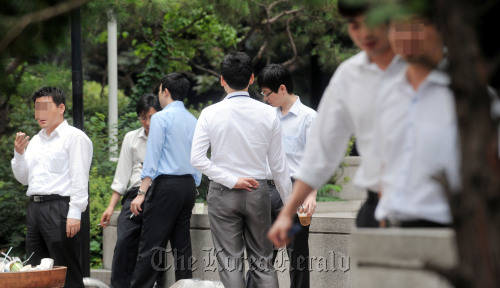Companies use incentives, anti-smoking aids and negative evaluation to help smokers quit
Keeping abreast with growing anti-smoking campaigns, major companies are stepping up efforts to drive cigarette smoke from the workplace.
Some big companies use a “carrot and stick” policy, such as offering incentives, anti-smoking aids and even negative evaluation, to help employees quit smoking.
The world’s fourth-largest steelmaker POSCO was one of the first among local conglomerates to establish a smoke-free environment.
Soon after taking office as the company’s chairman in 2009, Chung Joon-yang initiated a company-wide anti-smoking campaign.
“It’s something the chairman has emphasized ever since he was the head of the steelworks in Gwangyang,” a POSCO official said. He said that most if not all of the company’s 17,000 employees have quit the habit, and that most POSCO subsidiaries are also conducting similar campaigns.
The POSCO official added that overall the campaign had a beneficial influence on the company and its employees.
“First of all, there is the health issue, and as quitting removed the time spent going back and forth to and from the smoking area it has also proven beneficial to productivity. And families of the quitters have also welcomed the changes.”
Even SK Group, which appeared to be more lenient towards smokers, has made its headquarters in Seoul non-smoking. The company had until recently maintained smoking rooms on each floor of the building.
“Not smoking has been a social trend for some time now, and with more and more people choosing not to smoke the change was aimed partly at protecting their rights,” a SK Group official said.
Keeping abreast with growing anti-smoking campaigns, major companies are stepping up efforts to drive cigarette smoke from the workplace.
Some big companies use a “carrot and stick” policy, such as offering incentives, anti-smoking aids and even negative evaluation, to help employees quit smoking.
The world’s fourth-largest steelmaker POSCO was one of the first among local conglomerates to establish a smoke-free environment.
Soon after taking office as the company’s chairman in 2009, Chung Joon-yang initiated a company-wide anti-smoking campaign.
“It’s something the chairman has emphasized ever since he was the head of the steelworks in Gwangyang,” a POSCO official said. He said that most if not all of the company’s 17,000 employees have quit the habit, and that most POSCO subsidiaries are also conducting similar campaigns.
The POSCO official added that overall the campaign had a beneficial influence on the company and its employees.
“First of all, there is the health issue, and as quitting removed the time spent going back and forth to and from the smoking area it has also proven beneficial to productivity. And families of the quitters have also welcomed the changes.”
Even SK Group, which appeared to be more lenient towards smokers, has made its headquarters in Seoul non-smoking. The company had until recently maintained smoking rooms on each floor of the building.
“Not smoking has been a social trend for some time now, and with more and more people choosing not to smoke the change was aimed partly at protecting their rights,” a SK Group official said.

“There is the health issue, but removing the smoking rooms has increased efficiency at work. For instance, before during a long meeting some people would take a smoking break but now that that is not possible, meetings have become more compact.”
With POSCO leading the charge, many of the country’s better known business groups have introduced measures to encourage smokers to quit.
Such measures range from cash to distributing anti-smoking aids.
In 2007, the drug maker Dong Wha Pharm Co. provided a six-week supply of nicotine patches while Samsung Corning Precision Materials bought 500 electronic cigarettes to help employees to quit.
Others, such as Kolon Group are operating a “non-smoking fund” as an incentive to kick the habit.
Those opting in deposit 200,000 won ($184), and if successful in not smoking for six months are given 1 million won.
“The campaign is part of our ‘Fun Management’ and our president strongly supports the anti-smoking drive,” a Kolon Group official said.
“The system was launched this month, and those who do not want to quit don’t have to take part in the campaign, but so far the participation rate is over 50 percent.”
While most firms are offering carrots to encourage participation in anti-smoking campaigns, others have opted to use the stick.
Strict measures are in place at Lotte Department Store, the country’s leading retailer.
In August, employees signed a letter declaring that they would stop smoking, and if they failed would be disadvantaged in personnel evaluation, which could be a barrier to their promotion.
The company periodically conducts smoking tests on its staff without notice to check if they smoked outside the office or at home, with the assistance of the Korea Association of Health Promotion.
Asiana Airlines, while not as stringent, also has a prohibitive policy.
“Anti-smoking policies were introduced around 1990, and the office was designated as a non-smoking building,” an Asiana Airlines official said.
“Since the campaign is long-established, there are no particular benefits for those who quit but there may be disadvantages to those who are caught smoking on the premises.”
However, some large companies remain unfazed by the anti-smoking frenzy.
Once such business is the country’s second largest conglomerate Hyundai Motor Group, which has not so much as held promotional events to encourage smokers to quit.
“The group has no anti-smoking measures in place. Whether or not someone smokes is left up to the individual,” an official at Hyundai Motor Group said.
By Choi He-suk and Shin Hyon-hee
(cheesuk@heraldcorp.com) (heeshin@heraldcorp.com)








![[Graphic News] More Koreans say they plan long-distance trips this year](http://res.heraldm.com/phpwas/restmb_idxmake.php?idx=644&simg=/content/image/2024/04/17/20240417050828_0.gif&u=)
![[KH Explains] Hyundai's full hybrid edge to pay off amid slow transition to pure EVs](http://res.heraldm.com/phpwas/restmb_idxmake.php?idx=644&simg=/content/image/2024/04/18/20240418050645_0.jpg&u=20240419100350)





![[From the Scene] Monks, Buddhists hail return of remains of Buddhas](http://res.heraldm.com/phpwas/restmb_idxmake.php?idx=652&simg=/content/image/2024/04/19/20240419050617_0.jpg&u=20240419175937)

![[KH Explains] Hyundai's full hybrid edge to pay off amid slow transition to pure EVs](http://res.heraldm.com/phpwas/restmb_idxmake.php?idx=652&simg=/content/image/2024/04/18/20240418050645_0.jpg&u=20240419100350)

![[Today’s K-pop] Illit drops debut single remix](http://res.heraldm.com/phpwas/restmb_idxmake.php?idx=642&simg=/content/image/2024/04/19/20240419050612_0.jpg&u=)